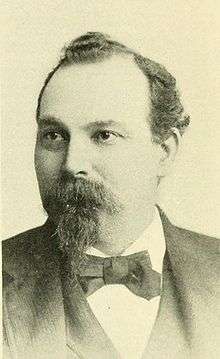Shobal Vail Clevenger, Jr.
| Shobal Vail Clevenger, Jr. | |
|---|---|
 |
Shobal Vail Clevenger, Jr. (born in Florence, Italy, 24 March 1843; died 24 March 1920[1]) was a United States physician who specialized in nervous and mental diseases.
Biography
He was the son of sculptor Shobal Vail Clevenger, who died the year he was born. He received his early education in the Jesuit college of New Orleans, and later graduated from the Chicago Medical College. In 1860 he filled a clerkship in a St. Louis bank, which he resigned to visit New Mexico, crossing the plains for this purpose. Returning soon after the beginning of the American Civil War, he enlisted in the U. S. Army, and served in the engineer corps, attaining the rank of first lieutenant. Subsequently he was engaged in surveying in Montana and Dakota, and filled the office of U. S. deputy surveyor. Later he built the first telegraph line through Dakota, and for a time was chief engineer of the Dakota Southern Railroad.
In 1873 he began the study of medicine under army surgeons in Fort Sully, while holding the appointment of civilian meteorologist in the U.S. Signal Service. He settled in Chicago in 1879, and after studying medicine became a specialist in nervous and mental diseases. For some years he was pathologist to the Chicago County Insane Asylum, and he was consulting physician in his specialties to the Michael Reese Hospital and to the Alexian Brothers' Hospital. He also held the professorship of anatomy in the Art Institute of Chicago.
Clevenger was a member of many scientific organizations.
A collection of his papers are held at the National Library of Medicine. [2]
Works
Clevenger was a frequent contributor to the scientific press. He also published:
- Treatise on Government Surveying (New York, 1874)
- Comparative Physiology and Psychology (Chicago, 1885)
- Lectures on Artistic Anatomy and the Sciences Useful to the Artist (New York, 1887)
References
- ↑ "Subjects of Biographies". Dictionary of American Biography. Comprehensive Index. New York: Charles Scribner's Sons. 1990.
- ↑ "Shobal Vail Clevenger Papers 1864-1924". National Library of Medicine.
 This article incorporates text from a publication now in the public domain: Wilson, James Grant; Fiske, John, eds. (1900). "Clevenger, Shobal Vail". Appletons' Cyclopædia of American Biography. New York: D. Appleton.
This article incorporates text from a publication now in the public domain: Wilson, James Grant; Fiske, John, eds. (1900). "Clevenger, Shobal Vail". Appletons' Cyclopædia of American Biography. New York: D. Appleton.